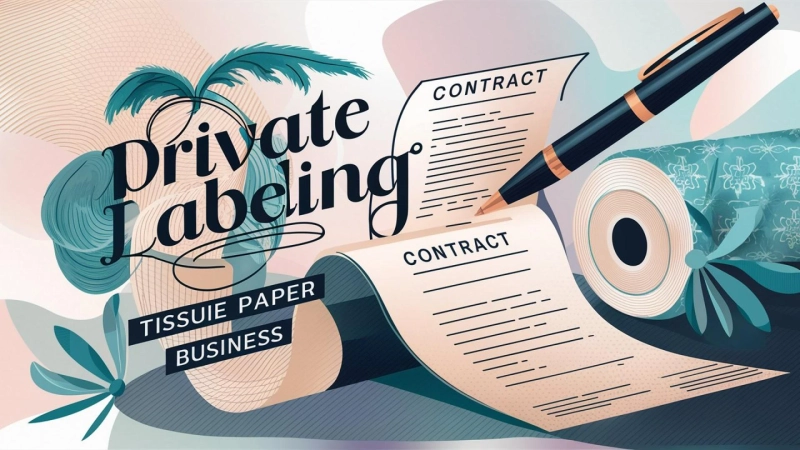Private labeling is a strategic approach that can significantly enhance the profitability and brand presence of your tissue paper business. This business model allows you to sell tissue products under your own brand name, leveraging existing manufacturing capabilities. By understanding how private labeling works and its benefits, you can make informed decisions that lead to greater market share and customer loyalty.
Understanding Private Labeling
Private labeling involves a manufacturer producing goods that are then marketed and sold under a retailer\'s brand name. In the context of tissue paper, this means you, as a business owner, partner with a manufacturer to produce tissue box and tissue roll products branded with your own logo and design.
Benefits of Private Labeling for Tissue Paper Businesses
Brand Differentiation
One of the primary advantages of private labeling is the ability to differentiate your brand in a crowded market. By offering unique packaging, designs, and branding elements, you create a distinct identity that stands out from generic or well-known brands. This differentiation can attract customers who are looking for something new or who prefer to support smaller, niche brands.
Control Over Product Quality
With private labeling, you have greater control over the quality of the products you sell. You can specify the materials, texture, and features of your tissue paper, ensuring they meet your standards and customer expectations. This control helps build a reputation for quality and reliability, which is crucial for long-term success in the tissue paper industry.
Higher Profit Margins
Private labeling can lead to higher profit margins compared to reselling branded products. By eliminating the middleman and working directly with manufacturers, you can reduce costs and set your own pricing strategy. This flexibility allows you to offer competitive prices while maintaining healthy profit margins, enhancing the financial health of your business.
Customer Loyalty and Repeat Business
Brand loyalty is a significant driver of repeat business. When customers associate your brand with high-quality tissue products, they are more likely to become repeat buyers. Private labeling helps foster this loyalty by providing a consistent and recognizable brand experience, which can lead to increased customer retention and word-of-mouth referrals.
Customization and Flexibility
Private labeling offers extensive customization options, allowing you to tailor products to specific market segments or customer preferences. Whether it’s creating eco-friendly tissue rolls or designing luxury tissue boxes, the ability to customize helps you address niche markets and meet diverse consumer needs. This flexibility can also facilitate quick adaptations to market trends and changes in consumer behavior.
Steps to Implement Private Labeling in Your Tissue Paper Business
Market Research
Before diving into private labeling, conduct thorough market research to understand consumer preferences, competitor offerings, and market gaps. Identify what unique value you can offer and how you can position your brand effectively.
Find a Reliable Manufacturer
Selecting a reliable and experienced manufacturer is crucial. Look for manufacturers with a proven track record in producing high-quality tissue products. Evaluate their capabilities, quality control processes, and production capacity to ensure they can meet your requirements.
Develop Your Brand
Invest time in developing a strong brand identity. This includes creating a compelling logo, packaging design, and overall brand messaging. Your brand should resonate with your target audience and convey the values and qualities you want to be associated with.
Set Pricing and Distribution Strategies
Determine your pricing strategy based on production costs, market positioning, and competitor pricing. Also, plan your distribution channels, whether it’s through retail stores, online marketplaces, or direct-to-consumer sales. Efficient distribution is key to ensuring your products reach the intended market effectively.
Marketing and Promotion
Once your private-labeled products are ready, implement a robust marketing and promotion strategy. Utilize digital marketing, social media, and other channels to create awareness and drive sales. Highlight the unique aspects of your tissue products and why they are a better choice compared to competitors.
Challenges and Considerations
While private labeling offers numerous benefits, it also comes with challenges. These include finding the right manufacturing partner, managing supply chain logistics, and ensuring consistent product quality. Additionally, marketing a new brand requires significant effort and investment. Being prepared for these challenges and having contingency plans in place can help you navigate the complexities of private labeling.
Conclusion
Private labeling can be a game-changer for your tissue paper business, providing opportunities for brand differentiation, higher profit margins, and increased customer loyalty. By taking control of product quality and customization, you can create a strong, recognizable brand that stands out in the market. With careful planning and execution, private labeling can enhance your business and drive long-term success.
Implementing a private labeling strategy requires diligence and strategic thinking, but the potential rewards make it a worthwhile endeavor for ambitious tissue paper businesses looking to expand their market presence and profitability.


